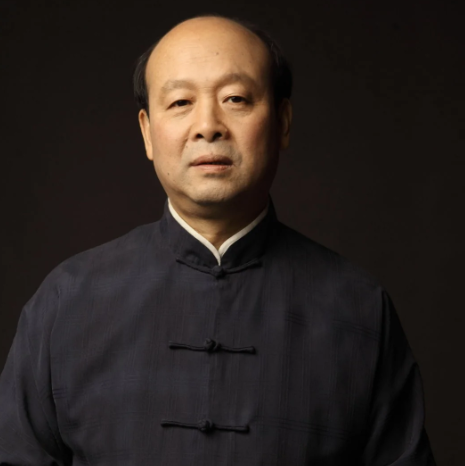Zeng Chengwei
Organized by 夜夜 on 2022-04-22

Zeng Chengwei, born in 1958, is a native of Chengdu, Sichuan Province. Guqin player and qin player. He is currently a professor of the Folk Music Department of the Sichuan Conservatory of Music, the vice president of the Chinese Qin Society, the executive director of the Musical Instrument Reform and Production Professional Committee of the Chinese National Orchestra Society, a member of the China Music Society, the president of the Chengdu Jinjiang Qin Society, and the director of the Zeng Chengwei Guqin Art Institute. . It has been rated as the "Representative Inheritor of Sichuan Style Guqin" by Sichuan, Chengdu, and provincial and municipal levels of intangible cultural heritage.
With more than 40 years of guqin career, Zeng Chengwei has not only inherited the traditional characteristics of Shu style guqin art, but also formed his own playing style. The style of the piano is steady and unrestrained, but not flashy. Not only the literati's dignified and elegant, not small charm, but also the musician's precise technique, rigorous interpretation of the skills. His performances are both divine and form, and are appreciated by both the refined and the popular. His representative repertoires include: "Flowing Water", "Peilan", "Autumn Water", "Confucius Reading Books", "Meeting God in a Lonely Pavilion" and so on. In recent years, he has held more than ten solo recitals in concert halls in Hong Kong, Beijing, Shanghai, Hangzhou, Nanjing, Chengdu and other places, and has been invited to perform and give lectures abroad many times. In 2011, he established Zeng Chengwei Guqin Studio (Zeng Chengwei Guqin Art Institute) and Yu Shaoze Memorial Hall in his own name, as the bases for the history of qin learning and qin research [4], and the institution conducts the dissemination, inheritance and teaching of guqin in society.
Similar artist
Yang Qing, a famous guqin master and music educator, was born in August 1951.
read >>
Ni Shiyun, a native of Haimen District, Nantong City, Jiangsu Province, China's famous contemporary qin mojo, the fourth generation inheritor of the Mei 'an Qin School, the representative inheritor of the intangible cultural heritage of Jiangsu Province "Guqin art" (Mei 'an Qin school), serves as the director of the Chinese Kunqu Opera Guqin Research Institute and the executive director of the Chinese Qin Association.
read >>
Yang Qiong, the word Yu Rong, Yushan Qin school successor, South Yuqin Club president, operation aman for more than ten years, good at qin songs. He is currently the vice president of Shenzhen Guqin Association, member of Shenzhen Ethnic Orchestral Association, lecturer of Shenzhen University School of Continuing Education and so on.
read >>
Yang Zhijian, Guqin maker and performer. Born in Shanghai in July 1974. National first-class performer; representative inheritor of Shanghai intangible cultural heritage "Guqin-making skills"; vice-chairman of Shanghai Intangible Cultural Heritage Protection Association. Winner of "Shanghai Craftsman" and "May 1st Labor Medal" in 2017.
read >>
Huang Deyuan, inheritor of the intangible cultural heritage "Zhejiang style guqin" and "Wenzhou dialect recitation".
read >>
Involving musical instruments
Guqin (pinyin: Gǔ Qín) is a traditional Chinese musical instrument with a history of at least 3,500 years. Guqin is also known as Yaoqin, Yuqin and Seven-stringed Qin. The guqin has 13 emblems that mark the rhythm, and is also a ritual and musical instrument. It belongs to the silk in the octave. Guqin has a wide range, deep timbre and long aftertone.
Involved portfolio
Involved news
Organized by 小何 on 2024-04-03
In the ancient times, Fuxi, the cultural ancestor of the Chinese nation, with his outstanding wisdom and profound insight into the universe, created a far-reaching artistic initiative -- piano making. This legend is like a bright pearl inlaid in the long history of Chinese civilization, and is still praised by later generations.
read >>
Organized by 未知领地 on 2024-03-17
When selecting a guqin, the timbre quality is often the primary criterion to judge its quality, because the timbre is not only related to the artistic expression of the guqin, but also deeply rooted in the unique pursuit of music aesthetics in traditional Chinese culture. Here are some basic timbre elements to consider when choosing a guqin.
read >>
Organized by Fucui on 2024-03-16
Guqin, as an ancient string instrument in China, has sophisticated fingering and contains profound aesthetic and philosophical ideas. In the process of learning Guqin, in addition to mastering correct fingering skills, avoiding mistakes is equally important. The following are five taboos that should be paid special attention to in Guqin fingerings.
read >>
Organized by 卷鹅 on 2024-03-14
With the arrival of the hot summer, for the guqin friends, how to do a good job in the hot and humid season of guqin maintenance is particularly important. Guqin as a traditional Chinese wooden chord instrument, its material is very sensitive to changes in temperature and humidity, so the correct maintenance of guqin in summer can not only extend the life of the instrument, but also maintain its pure timbre.
read >>
Organized by 南丘 on 2024-03-14
Among Chinese classical instruments, Guqin is highly respected by the world because of its profound cultural heritage and unique sound charm. The right-handed sound picking in its playing technique shows the characteristics of Guqin music, which is flexible and changeable and has profound charm. The right hand techniques of Guqin are rich and varied, including breaking, supporting, picking, hook, picking, beating, picking and other techniques, each technique contains high artistic and profound musical expression.
read >>

 渝公网安备 50010702504639号
渝公网安备 50010702504639号